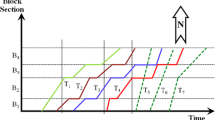Abstract
Rail transit plays an increasingly important role in the public transportation system, and effectively reducing its huge energy consumption is of great practical significance. An optimization method is proposed to minimizes energy consumption by comprehensively considering speed limit, track alignment and running time. The objective function is total energy consumption. The decision variables are the location where train enters the state of coasting. A simulated annealing algorithm(SA) is developed to search for optimized coasting point. The developed model is applied to a particular segment of route in Shanghai. Experiment results demonstrate that, although there was a mite increase of running time, the method could effectively reduce energy consumption.
Access this chapter
Tax calculation will be finalised at checkout
Purchases are for personal use only
Preview
Unable to display preview. Download preview PDF.
Similar content being viewed by others
References
Ma, C., Mao, B., Liang, X., et al.: Coast control of urban train movement for energy efficiency. Journal of Transport Information and Safety 28(2), 37–42 (2010)
Kim, K., Chien, S.I.-J.: Optimal train operation for minimum energy consumption considering track alignment, speed limit and schedule adherence. Journal of Transportation Engineering 137(9), 665–674 (2011)
Ke, B.-R., Lin, C.-L., Yang, C.-C.: Optimisation of train energy-efficient operation for mass repid transit systems. IET Intelligent Transport Systems 6(1), 58–66 (2012)
Ding, Y., Liu, H., Bai, Y., et al.: A two-level optimization model and algorithm for energy-efficient urban train operation. Journal of Transportation Systems Engineering and Information Technology 11(1), 96–101 (2011)
Mao, B., He, T., Yuan, Z., et al.: A general-purposed simulation system on train movement. Journal of the China Railway Society 2(1), 1–5 (2000)
Wen, X., Du, Z., Yang, L.: Traction curve optimization of straddle-type monorail train based on genetic algorithm. Railway Locomotive & CAR 31(4), 83–87 (2011)
Chen, R., Zhu, C., Liu, L.: CBTC based urban rail transit train energy consumption algorithm and simulation. Application Research of Computers 28(6), 2126–2129 (2011)
Ye, H.: Introduction to UMT. China Railway Press, Beijing (2009)
Zeng, Y., Yu, W., Hu, H., et al.: Hierarchical restriction Method for traction calculation of high-speed railway. China Railway Science 30(6), 97 (2009)
Bocharnikov, Y.V., Tobias, A.M., Roberts, C., et al.: Optimal driving strategy for traction energy saving on DC suburban railways. IET Electic Power Applications 1(5), 675–682 (2007)
Author information
Authors and Affiliations
Editor information
Editors and Affiliations
Rights and permissions
Copyright information
© 2013 Springer-Verlag Berlin Heidelberg
About this paper
Cite this paper
Xie, T., Wang, S., Zhao, X., Zhang, Q. (2013). Optimization of Train Energy-Efficient Operation Using Simulated Annealing Algorithm. In: Li, K., Li, S., Li, D., Niu, Q. (eds) Intelligent Computing for Sustainable Energy and Environment. ICSEE 2012. Communications in Computer and Information Science, vol 355. Springer, Berlin, Heidelberg. https://doi.org/10.1007/978-3-642-37105-9_39
Download citation
DOI: https://doi.org/10.1007/978-3-642-37105-9_39
Publisher Name: Springer, Berlin, Heidelberg
Print ISBN: 978-3-642-37104-2
Online ISBN: 978-3-642-37105-9
eBook Packages: Computer ScienceComputer Science (R0)




